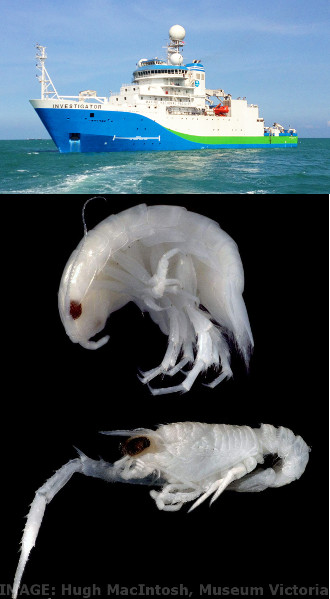Bight review finds species, supplies

Australian scientists have completed a $20 million survey of the Great Australian Bight, uncovering new aquatic species and oil reserves.
The Great Australian Bight Research Program found 275 new species - tiny organisms including decapods, isopods and polychaete (a type of worm).
CSIRO experts collected more than 63,000 specimens from depths between 200 and 4,000 metres.
They also looked at “iconic species” and apex predators of the Bight, discovered that the majority of Australia's sea lions and fur seals live in the Bight, and were able to deploy more tags to track the movements of southern bluefin tuna and sharks.
The project was largely funded by BP, and was able to uncover evidence of significant offshore oil and gas reserves in the form of small balls of tar and asphaltites — solid hydrocarbons.
BP transferred its exploration rights for oil in the Bight to Statoil after the survey was launched, meaning the oil and gas reserves could end up being exploited by a number of related companies.
The project was carried out independently by the CSIRO, the South Australian Research and Development Institute, the University of Adelaide and Flinders University.
“Before this program, very little was understood about the deep waters of the Bight,” research director Dr Ben Baghurst told the ABC.
“Thanks to the research from more than 100 of Australia's leading scientists and technical staff over the last four years, we have models, tools and data that will be freely available to help inform future management of the Bight.”
The CSIRO's Dr Alan Williams said there were some fascinating finds.
“We've collected many hundreds of species of fishes, larger epifauna — things like coral sponges, echinoderms and so forth and a large proportion of these are new, that is never before seen by scientists,” Dr Williams said.
“Although our survey has turned up literally hundreds of species, the data also shows that we can expect to see many more if we increase or extend our sampling effort.”
Dr Baghurst said people should not read much into the fact that BP funded most of the trip.
“Their involvement is at a management committee level, so we get out there, and I help the scientists do their research,” he said.
“It's not directed to BP, or the oil industry, or the ecotourism industry, it's about getting that holistic view so that we can then look at the impacts of whatever developments come along.”








 Print
Print